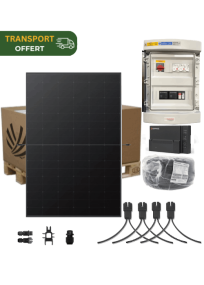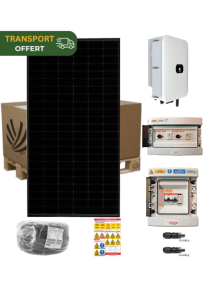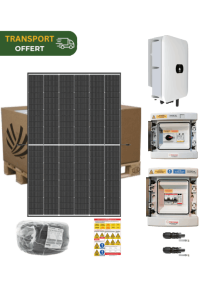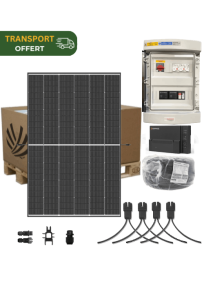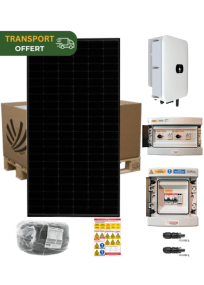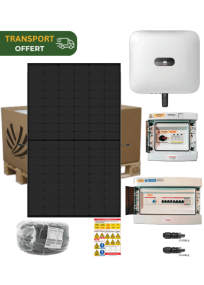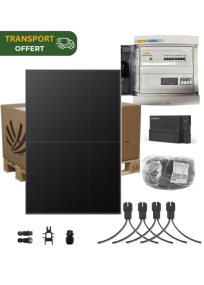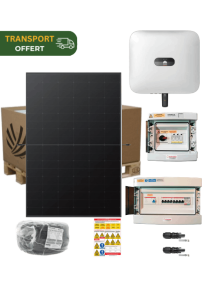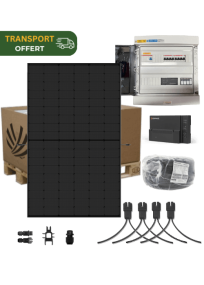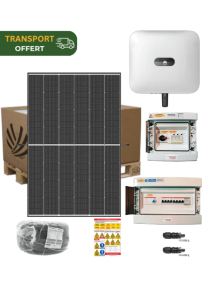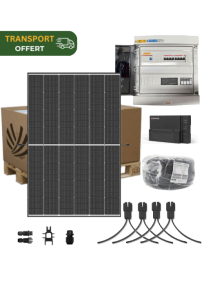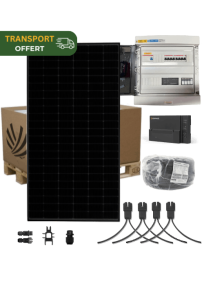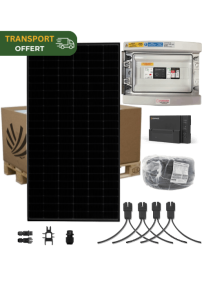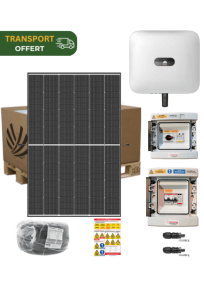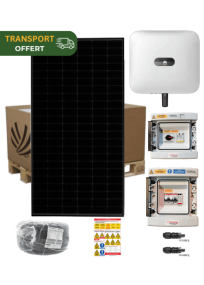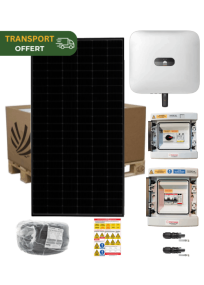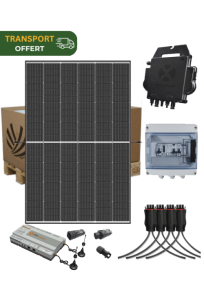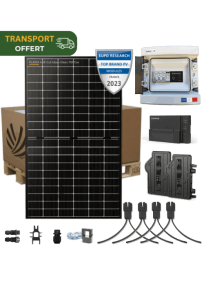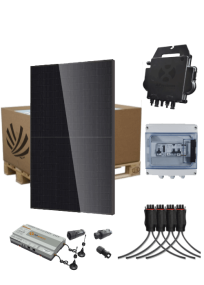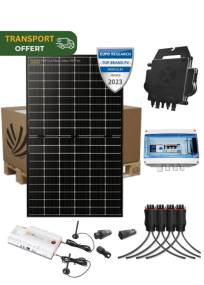Maximising self-consumption with a 6000W solar kit
Solar self-consumption is a revolution in the field of renewable energy. The idea is to harness the sun's energy directly for your own use. But how do you maximise this self-consumption?
The answer lies in a powerful tool: a 6000w solar kit.
This article will explore the technical aspects of these solar kits. We'll look at how they can help you achieve energy independence, save money and contribute to a greener future.
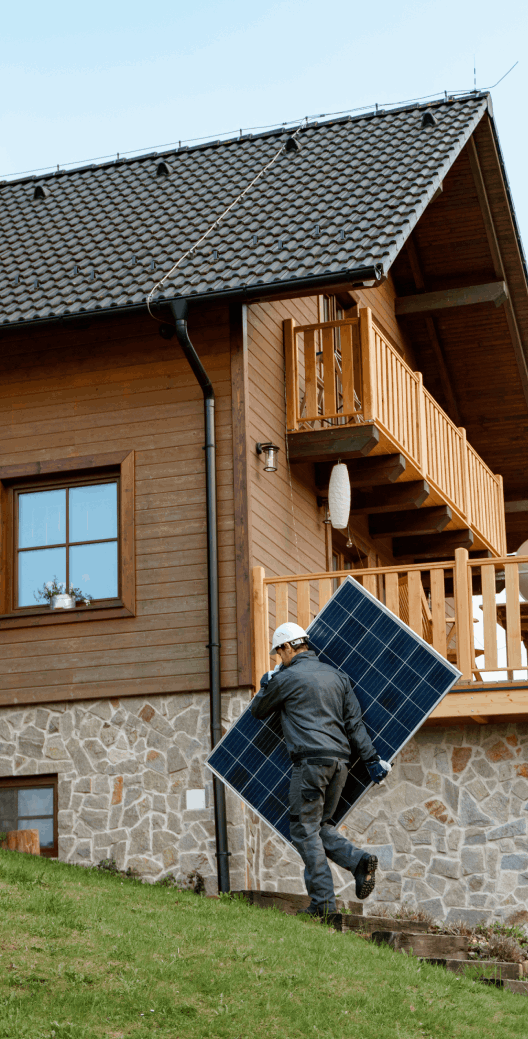
Understanding solar self-consumption
Solar self-consumption is a simple concept. It involves producing your own electricity from solar energy. And consuming that electricity directly.
This reduces your dependence on the electricity grid. And save money on your electricity bill. But self-consumption also has other advantages.
It helps to reduce greenhouse gas emissions. And it promotes energy independence.
To maximise self-consumption, there are a number of factors to consider.
- Choice of solar kit
- The orientation and inclination of the solar panels
- Managing the energy produced
- System maintenance
Each of these elements plays a key role. And must be carefully considered. In the following sections, we'll explore each of these elements in detail. And give you some advice on how to maximise your solar self-consumption. So, let's start by understanding what a 6000w self-consumption solar kit is.
What is a 6000w self-consumption solar kit?
A 6000w self-consumption solar kit is a complete system. It is designed to produce electricity from solar energy.
And to consume this electricity directly. It consists of several components:
The solar panels capture the sun's energy. And convert it into electricity. The inverter converts this electricity into alternating current.
Which can be used to power electrical appliances in the home. A 6000w self-consumption solar kit is ideal for a medium-sized house.
It can cover a large proportion of your electricity needs. But the actual yield depends on a number of factors:
- The amount of sunshine in the region
- The orientation and inclination of the panels
- The home's electricity consumption
So it's important to assess these factors carefully. Before choosing a 6000w self-consumption solar kit.
Maximise self-consumption with a solar kit
Solar self-consumption is a fast-growing trend across the world. More and more homeowners, entrepreneurs and eco-citizens are looking for efficient ways to generate their own electricity, reduce their carbon footprint and save money on their energy bills.
With increased awareness of sustainability and renewable energy, turning to a solution like a 6000w self-consumption solar kit with battery is becoming a popular option.
Understanding solar self-consumption
Solar self-consumption is a simple but powerful concept. By generating their own electricity from solar power and consuming it directly, users can not only reduce their dependence on the electricity grid, but also benefit from substantial savings on their electricity bills.
It's important to understand that this approach isn't just about producing energy. It's also about the intelligent management and use of the energy produced. Energy storage, thanks to a battery, plays an essential role in ensuring a continuous supply, even when the sun isn't shining.
The many advantages of solar self-consumption
Beyond the savings on electricity bills, solar self-consumption offers a host of advantages. It allows you to :
- Reduce greenhouse gas emissions by reducing dependence on fossil fuels.
- Promote energy independence by enabling users to produce their own electricity.
- Stabilise costs by protecting against the volatility of market energy prices.
Understanding these benefits makes it easier to appreciate the importance of opting for a 6000w self-consumption solar kit.
What is a solar self-consumption kit 6000w?
A solar self-consumption kit 6000w is a set of components specifically designed to generate electricity from solar energy. This kit usually includes solar panels, an inverter, a mounting system, cables and connectors, as well as, in most cases, a battery to store the excess energy produced.
Installing such a kit is an investment that may seem costly at first, but it is a long-term solution that can offer substantial returns on investment.
The importance of battery in a self-consumption system
The battery is a fundamental element in a solar self-consumption system. It allows to store the energy generated during the day for later use. This is particularly useful on cloudy evenings and days when solar panels do not produce enough electricity.
Which battery for solar panel 6000w?
When choosing a battery for a solar system, there are several types to consider. Lead-acid batteries, for example, are often affordable and widely available, but they have drawbacks such as shorter life and more frequent maintenance. On the other hand, lithium-ion batteries, although more expensive, offer superior performance with a longer life and less maintenance.
To maximize system efficiency, an energy needs assessment and consultation with a professional can be beneficial.
Solar self-consumption kit 6000w with lithium battery
The solar self-consumption kit 6000w with lithium battery is a modern and efficient solution for households wishing to maximize their energy independence. This type of kit includes solar panels capable of producing up to 6000 watts of electricity, combined with a lithium-ion battery that allows the excess energy to be stored for future use.
Advantages of lithium-ion battery
- Long life: Lithium-ion batteries have a significantly longer service life than their lead-acid counterparts. They can last 10 to 15 years, depending on use and maintenance.
- Energy efficiency: These batteries offer high efficiency, meaning you can store more usable energy, reducing waste.
- Less maintenance: Unlike lead-acid batteries, lithium-ion batteries require much less maintenance, making them a less burdensome option for users.
- Compact and lightweight: They are generally smaller and lighter than traditional batteries, making it easy to install and integrate into limited spaces.
Application in the self-consumption system
As part of a solar kit of 6000w, the combination with a lithium-ion battery allows to store the energy produced during the day. This means that even on cloudy days or at night, users can benefit from a constant supply of electricity. This is particularly beneficial for households that consume a lot of electricity in the evening or at night.
Solar self-consumption kit 6000w with battery Huawei
Huawei is a leading player in energy technology, and its energy storage solutions are recognized for their quality and innovation. The Huawei 6000w self-consumption solar kit with battery offers a smart and efficient option for consumers who want to optimize their power consumption.
Advantages of the Huawei battery
- Advanced technology: Huawei batteries incorporate cutting-edge technologies, making them reliable and powerful. Designed to maximize energy efficiency and extend system life.
- Intelligent management system: Huawei offers an energy management system (EMS) that allows users to monitor and manage their electricity consumption in real time, ensuring optimal use of resources.
- Compatibility and integration: Huawei batteries are compatible with a variety of solar panels and inverters, making it easy to integrate into an existing or new solar system.
- Enhanced security: Huawei batteries are equipped with advanced security systems to prevent overloads, short-circuits and other potential hazards, ensuring safe use.
Application in the self-consumption system
By combining a self-consumption solar kit of 6000w with a Huawei battery, users benefit from a complete solution that allows them not only to produce their own electricity but also to store it efficiently for future use. The intelligent system allows for optimized energy management, maximizing savings on electricity bills and reducing dependence on the grid.
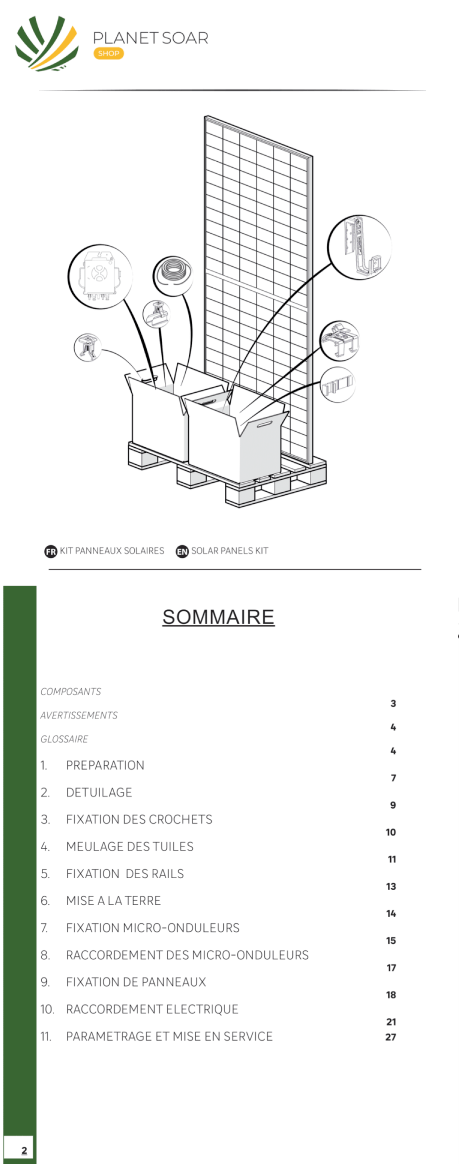
Installation and use of the 6000w solar self-consumption kit
Installing a solar kit is not a task to be taken lightly. Not only does it require technical skills, but it is also essential to comply with safety standards to ensure that the system operates at optimum efficiency.
Steps to installing a self-consumption solar kit with battery
Here are the main steps for a successful installation:
- Choosing a site for the solar panels: The site should be well exposed to the sun, away from the shadows of trees and buildings.
- Installing the solar panels: The panels should be securely fixed to withstand all weather conditions.
- Installing the inverter: This device converts the direct current produced by the panels into alternating current used by electrical appliances.
- Installing the battery: Place it in a cool, dry place to maximise its life.
- Connection to the electrical panel: Proper connection to the home's electrical system is essential.
- Commissioning the system: Before using, check that everything is working correctly and safely.
A professional can facilitate this complex installation, ensuring that every step is carried out with precision to maximise the system's efficiency.
Optimisation of self-consumption: energy management and monitoring
To get the most out of your 6000w self-consumption solar kit, it's essential to implement energy monitoring and management tools. These tools allow you to :
- Monitor energy production: Keep an eye on the amount of energy produced to better understand your consumption.
- Identify peak consumption periods: This helps you adjust your use of appliances to coincide with production peaks.
- Optimise use of stored energy: By making intelligent use of the energy stored in the battery, you can further reduce your dependence on the grid.
Use intelligent management systems
Intelligent management systems can be invaluable allies for solar system owners. Not only can they remotely control your appliances, but they can also automate certain processes, such as recharging batteries during periods of high production.
Frequently Asked Questions (FAQs)
1. What battery for solar panel 6000w?
When it comes to choosing a battery for a solar system of 6000w, several options are available to you. Lead-acid batteries, such as AGM or gel batteries, are often less expensive but have a shorter life and require regular maintenance. Lithium-ion batteries, although more expensive to purchase, offer better performance with longer life cycles, greater energy efficiency and reduced maintenance. For a solar self-consumption kit 6000w, it is recommended to opt for a lithium-ion battery with a capacity of at least 5 kWh to ensure a constant supply of energy even during periods without sun.
2. What can be powered with a solar panel 6000w?
A solar self-consumption kit of 6000w can power a wide variety of devices in an average home. This includes common appliances such as refrigerators, washing machines, lights, televisions, computers and even air conditioners. On average, a system of this size can cover the electricity needs of a moderate-consumption household, allowing you to significantly reduce or eliminate your monthly electricity bill.
3. What is the life of a self-consumption solar kit?
The life of a self-consumption solar kit can vary depending on several factors, including component quality, installation and maintenance. Solar panels typically have a lifespan of 25 to 30 years, but performance may decrease over time. Batteries, depending on their type, can last from 5 to 15 years. Regular maintenance will maximize the life of your system.
4. Does the installation of a solar kit require authorization?
Yes, in most cases, installation of a solar kit requires local permits. Regulations vary by region and country. It is therefore important to consult your local council or a solar installation professional to ensure that you comply with all legal requirements.
5. What orientation and inclination are ideal for solar panels?
To maximize energy production, solar panels must be oriented southward in the northern hemisphere. The optimal angle is usually between 30° and 45°, depending on your latitude and seasons. Some mounting systems also allow for seasonal adjustments, increasing their efficiency throughout the year.
6. Do solar panels work in cloudy weather?
Yes, solar panels work in cloudy weather, although their performance is reduced. They continue to generate electricity from the diffuse light that passes through the clouds. However, it is important to have a storage battery to ensure electricity supply during the days with little sunshine.
7. What are the costs associated with maintaining a solar system?
The maintenance of a solar system is generally low compared to the savings achieved. Most solar panels require occasional cleaning to remove dust and debris, and regular electrical system checks may be required to ensure proper operation. Batteries, depending on their type, may require a little more attention, especially if they are lead-acid.

